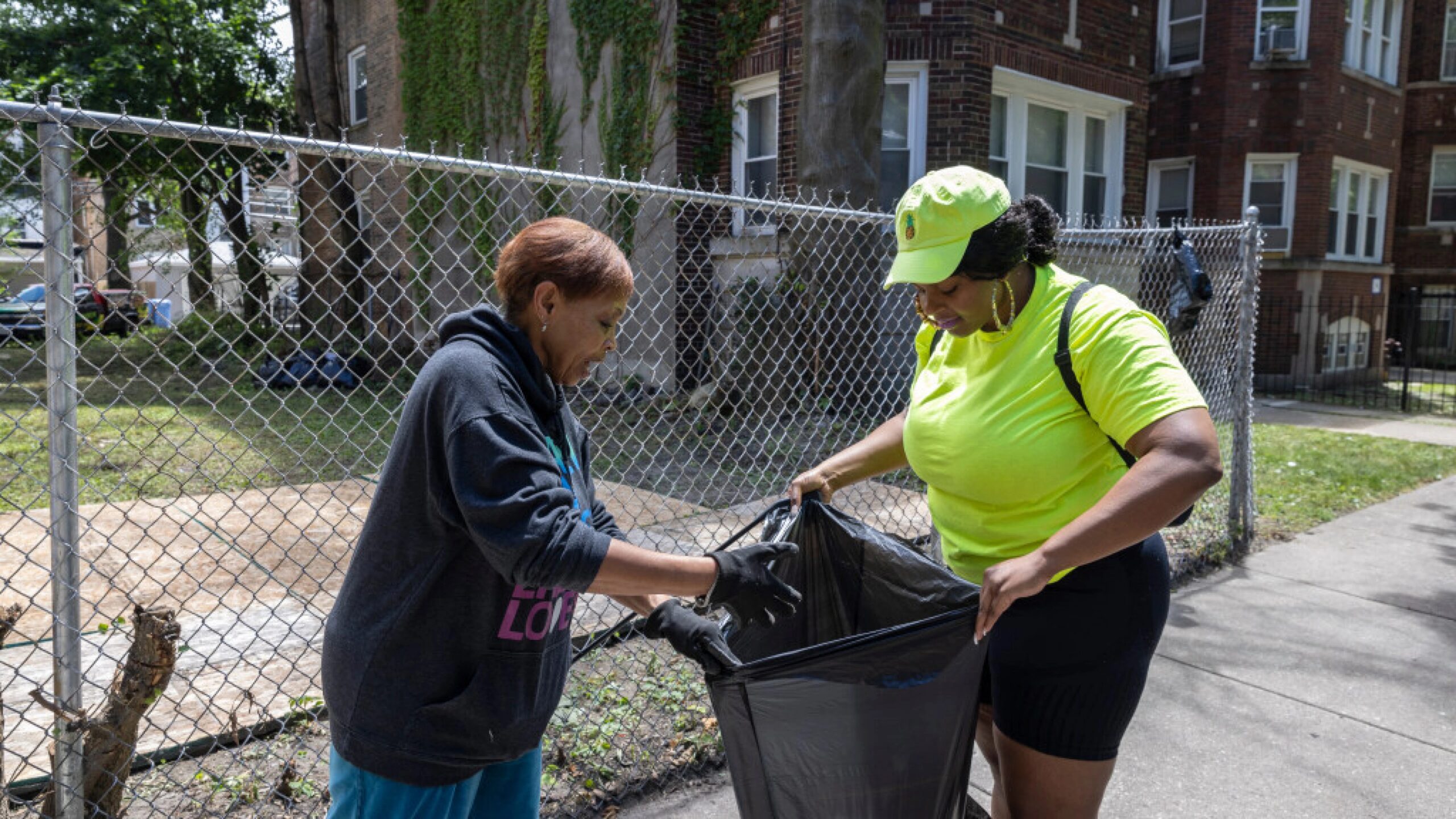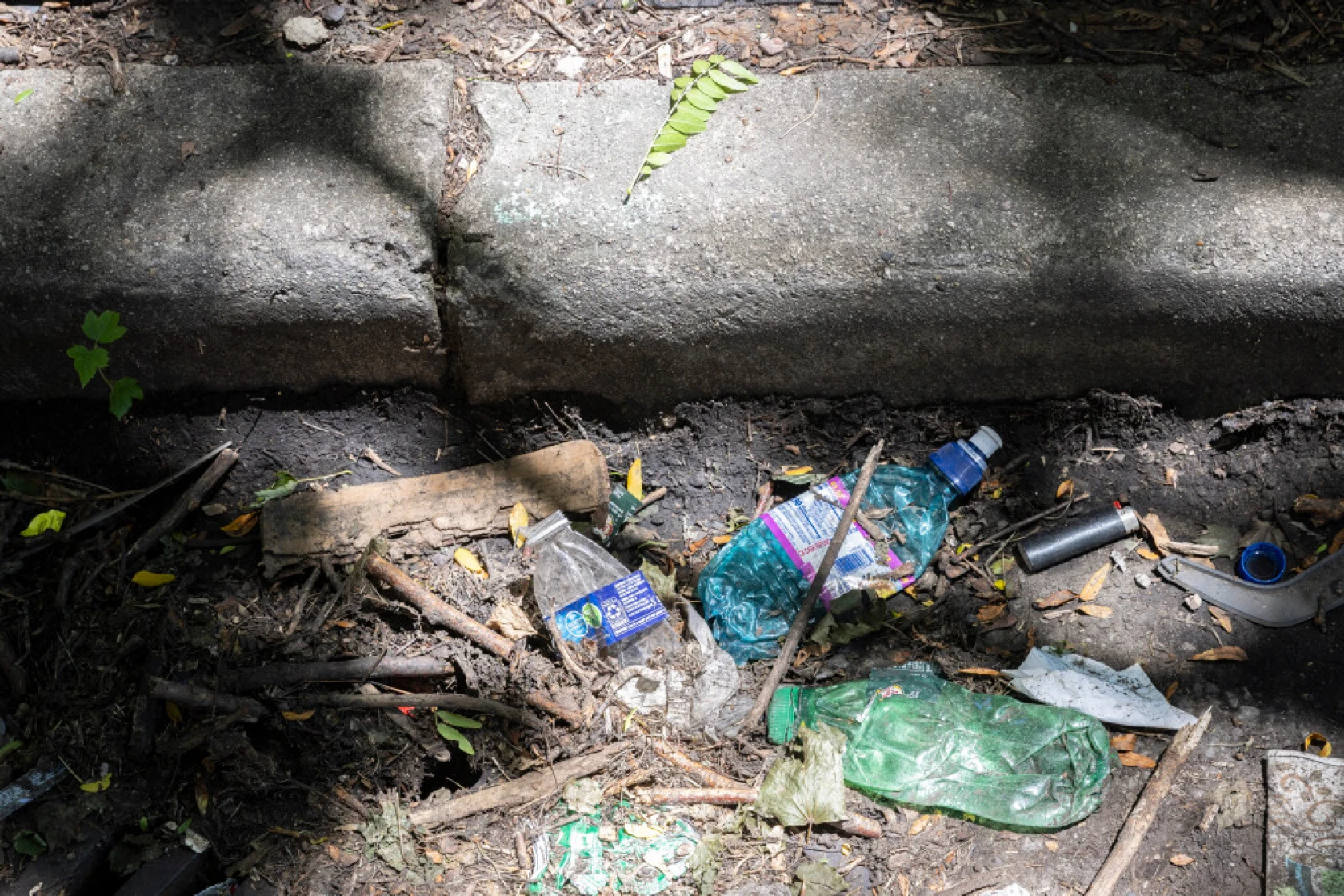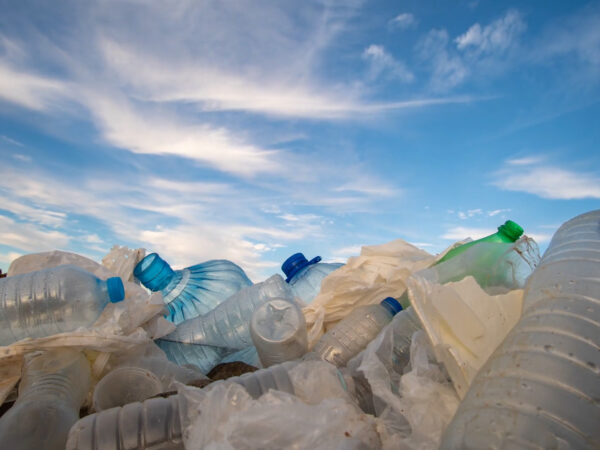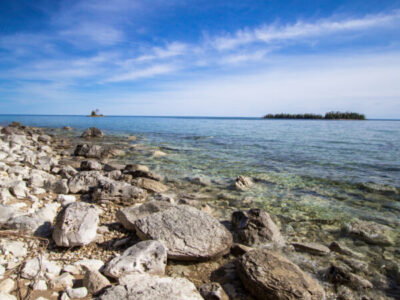
By Juanpablo Ramirez-Franco, WBEZ
This coverage is made possible through a partnership between WBEZ and Grist, a nonprofit, independent media organization dedicated to telling stories of climate solutions and a just future. Sign up for WBEZ newsletters to get local news you can trust.
Shanna Landheart balances one foot on the curb and uses the other to scrape away grass clippings, plastic wrappers and part of a Sbarro’s pizza box stuck to the street. Underneath the matted mess on Essex Avenue in Chicago’s South Shore neighborhood, she points to a storm drain.
“If you look in there it’s gonna be garbage, it’s gonna be trash,” said Landheart, 26, who lives nearby.
She is obsessed with trash. Always on the lookout, Landheart spots three large pools of standing water down the street where trash prevents rainwater from draining. For months, Landheart and a group of neighbors have banded together against the litter. Block club members wear fluorescent green T-shirts and haul 50-gallon trash bags to clean up the trash themselves.
But garbage won’t stop piling up and it’s snowballing into a public health crisis. An analysis by WBEZ found that over the past five years, South Shore racked up more reports of sanitation code violations than any other South Side community. Citywide, only Austin, West Town and Lincoln Park have had more complaints lodged. Despite the group’s best efforts, the litter won’t go away and it’s unclear who can help.
The violations are recorded through calls to 311, the city’s nonemergency hotline. Last year there were 350 violations reported in South Shore alone. In 2021, there were as many as 651 violations reported. Compare that to the Loop, which this year has only recorded 26 complaints. Other South Side communities such as Avalon Park, Hegewisch, Hyde Park, Kenwood and Woodlawn have reported less than 100 sanitation complaints per year since at least 2019.
There are rules for trash. The city’s sanitation code outlines where and how waste must be stored. Garbage bags always go in containers with tight-fitting lids — raw garbage can’t just sit in the open air. When it does, whether it be on a vacant lot, an alley or outside a property being renovated, anyone can report the offense as a sanitation code violation via 311. The violations can result in fines but don’t always.
Citywide, more than 6,000 sanitation code violations have already been reported this year.
Because nothing is changing in her community, Landheart isn’t clear on whose job it is to help.
“We supposedly have an alderman, supposedly have city services, supposedly have access to 311, but our streets look like this,” Landheart said, gesturing to plastic grocery bags fixed on fences — an effort by some neighbors to redirect the scraps from the parkway.

Plastic bottles and scraps of cardboard combine with debris from trees and lawns to form an impenetrable layer over catch basins in South Shore. The result is prolonged flooding along neighborhood streets. (Manuel Martinez/WBEZ)
Ald. Greg Mitchell, who represents the part of South Shore that Landheart is highlighting, did not respond to a request for comment. However, his office has lent the 7500-7800 block of Essex Avenue block club equipment to pick up trash.
The city’s Department of Water Management said it will respond to calls to clean up what’s inside storm drains, but the trash on top of grates is a bigger problem.
“It’s a point of sanitation — because it’s a trash issue and not necessarily a Department of Water Management issue,” DWM Commissioner Randy Conner said.
Some South Shore residents want more street sweeping. But Department of Streets and Sanitation Commissioner Cole Stallard said his crews are already doing everything they can.
“We’ll sweep, but we know that we’re going to still have storms that don’t coincide with the sweeping schedule,” Stallard said. He asks that block clubs like Landheart’s keep up their effort to keep the neighborhood clean and the storm drains unobstructed.
Public health concerns
Back on Essex Avenue, resident Jenise Jonah unclogs one of the storm drains. She’s Landheart’s neighbor and regularly helps clean the block.
“The debris is covering it so there’s no flow, and it creates a reservoir of a whole lot of bacteria and for mosquitoes to gather,” she said of the garbage jamming up the catch basins and leading to prolonged flooding on the street.
The litter isn’t just an inconvenient eyesore; it’s combining with stormwater and leading to hazardous conditions. Standing water on streets becomes a public health issue because it concentrates chemicals and bacterial growth right in the middle of neighborhoods, according to Sam Brody, a professor of disaster resilience at Texas A&M University.
“People can get life-threatening infections simply by stepping in stagnant water that has swept all this existing hazardous material from oil and gas to toxics, creating this soup of hazardous water,” Brody said.
He said the predicament in South Shore isn’t unique. Cities such as New York, Houston and Los Angeles don’t have the resources to keep the thousands of street drains cleared before a major rainfall event. This is increasingly a problem as climate change means more rain in Chicago.
Annual rainfall has increased between 5%and 15% across the Midwest over the past three decades, according to the federal government’s Fifth National Climate Assessment. An additional 8% to 20% increase is similarly projected in the region by 2050.
More rain is coming. But Jonah said today’s rain is already a problem.
“The whole entire block can be kind of drowned out with water,” Jonah said. “It sucks really bad. And we try our best to keep it clean, but if there is no street cleaning to prevent that debris, then it’ll just get worse.”
In the meantime, she and her neighbors put on their bright green shirts and bag the garbage all around South Shore.
Juanpablo Ramirez-Franco covers climate change and the environment for WBEZ and Grist. Follow him on X at @__juanpab.
Catch more news at Great Lakes Now:
Illinois lawmakers seek to protect state wetlands
Army Corps plans $1 billion barricade to deter invasive carp at Illinois and Des Plaines Rivers
Featured image: South Shore residents Deborah Moore and Shanna Landheart (right) partake in a community organized street cleanup on the 7700 block of Essex Avenue this summer. Neighbors say their streets aren’t cleaned enough by the city so they have had to take matters into their own hands. (Manuel Martinez/WBEZ)




